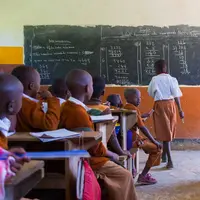Characteristics
A sound knowledge of human and societal developments is an essential basis for decisions in everyday life, politics, economics and business, law or medicine. Researchers in the Empirical Social Research on Education and Labour research focus area study social mechanisms in learning, teaching and labour processes and apply both empirical and analytical methods to the exploration of their varied ramifications for people, organisations and societies. To do this, they incorporate hypothesis-testing quantitative and hypothesis-generating qualitative methods.
The organisational framework for this research is formed in large part by the Leibniz Institute for Educational Trajectories at the University of Bamberg and the Bamberg Graduate School of Social Sciences (BAGSS) which originated from the German Excellence Initiative. These two groups promote interdisciplinary exchange both within the university and with other national and international research institutions. There are also close ties to the Institute for Employment Research (IAB) and the State Institute for Family Research at the University of Bamberg (ifb).
Activities are conducted in three interconnected research branches.
Branches

Education has a great impact on individual life opportunities, self-realisation and professional success. Furthermore, education affects social, economic, political and cultural participation. At the same time, competence development and educational attainment are dependent on the socioeconomic background. In this branch, researchers empirically, and oftentimes within international comparisons, investigate access to education, learning behaviour in schools, universities, families and companies. In addition, results and returns attributed to education and competence development from childhood through late adulthood are explored. Researchers use quantitative and qualitative methods in their analyses of how learners experience and shape their biographical education processes in formal, non-formal and informal learning arrangements. Finally, they consider individual skills acquisition in relation to the didactic structure of courses, teaching and guidance in schools and out-of-school education institutions.

Research conducted in the Business and Labour Market research branch is focused on employees, modes of labour and commercial organisations. Researchers in this branch study the preconditions for functional work and structural changes, not only on the social level (labour markets, economic and social policy, migration, industrial relations or occupational composition) but also on the organisational level (company and labour organisation, or personnel development and structuring) and the individual level (individual employment history, qualification development and stress related to work or career and career success). These aspects are analysed in their various mutual relationships to one another. A particular focus is placed on the development of professional skills, (international) career trajectories, and the significance of migration, ageing and health.

The Methods and Statistics branch – and particularly the areas of empirical modelling and the mathematical modelling of social, political and economic processes and issues – is a crucial foundation for research in the social sciences and economics and business administration. Researchers in this branch deal with practical applications, statistical methodological assistance, consulting and cooperation, as well as with the development and expansion of statistics and econometrics, survey methodology and computer simulation.
Research Centres, Affiliated Institutes
Research Centre of Applied Sports Science
Research Centre of Applied Human Resource Psychology
Research Centre for Counselling in Teacher Education
Centre for Teacher Training (ZLB)
Leibniz Institute for Educational Trajectories (LIfBi) at the University of Bamberg
State Institute for Family Research at the University of Bamberg (ifb)
Graduate Schools and Doctoral Programmes
Masterstudiengänge
Current research projects and findings are incorporated into the University of Bamberg’s degree programmes, ensuring that our curricula reflect the most up-to-date research in this profile field. This is particularly true of the following master’s degree programmes:
Vocational Education/Social Pedagogy and Social Services |Business Administration| Educational Quality in Developing Countries | Empirical Educational Research | Adult and Further Education | Educational Science| Communication Studies | Political Science | Studies in Religion and Education | Sociology| Economics and Business Education|Education in Business and Information Systems
